
5 minute read
American View of Agriculture
The American View of Agriculture by ALEJANDRO LEPCZYK staff writer A look behind the scenes of the difficulty of finding seasonal employment in the agricultural industry.
The Grand Traverse economy relies heavily on two things: tourism and agriculture. This area has a large farming community. With that farming community comes fresh produce, farmers markets, and cooperatives, not to mention goods that are packaged for sale outside of our immediate area. This industry provides a lot of jobs for the region; however, it is difficult to attract and retain employees, presumably due to the hard work, long hours, and typically lower pay. A 2018 statistic highlighted that only 0.08 percent of American jobs are dependent on agricultural employment. According to the New York Times, in 1987, nearly five million people lived on farms, and that number has consistently decreased by nearly two percent each year. Does Michigan have an effect on the bigger picture of agriculture as a whole? Yes, it does. It is reported that McDonald’s purchased 1.5 million Michigan-sourced apples last year to be cut up and be placed in their ‘Happy Meals.’ This past year Michigan’s treasury published that 104.7 billion dollars are annually contributed to the economy through the agricultural industry. In an age of internet diets and social media trends, a popularity in co-ops and farmers markets have increased the younger generation’s interest in fresh produce, as can be seen at local produce sold at touristy or boutique retailer locations. These places often sell to a more affluent group. Why is there such a lack of interest in seasonal employment when millions of people are out of work? One of our BGQ staffers with agriculture connections confirmed that they were in desperate need for employees. He mentioned that this year not all of the fruit was able to be picked, resulting in a poor season for their farm. Many other local farms have suffered from the same problem. Many US farmers have made claims that Americans have moved on from farming to seek opportunities in urban areas. This exodus, which has sometimes been referred to as a brain drain, has resulted in farmers becoming more dependent on migrant workers. Hispanic immigrants pick a wide variety of local fruit, primarily including apples, cherries, and grapes. These workers typically get paid very little; the reason for this is that they are not valued in our current society. Maybe it is time to start appreciating the people who are willing to do the work that many American citizens are not. The problem here is pay; many will often claim that migrant workers are stripping American people of their employment, yet they refuse to raise minimum wage, leaving the situation at an awkward balance. They don’t want the migrants coming into the country but American people have little interest in an agricultural profession. This leaves us with two different choices. Do we offer higher pay? Or do we choose to allow more workers in on work visas? Even musical artist and recent presidential candidate Kanye Omari West spoke about this issue in his 2005 song Heard ‘em Say: “Before you ask me to go get a job today/Can I at least get a raise of the minimum wage?” That same mindset appears to be held by many American citizens who have little interest in farm labor due to the low pay that is often offered. Farming is no longer a profession one can truly take pride in chasing. “There is a very high demand for dependable, skilled labor and it is getting harder to come by,” explained local vineyard manager Craig Cunningham. Mostly focusing on Vinifera wine grapes, Cunningham managed a “baby vineyard” this past season, and ran a crew of only five to seven workers. I also asked Cunningham about the effect COVID-19 has
Advertisement
Photos: Courtesy of Andy Clapham & Paul Osborne
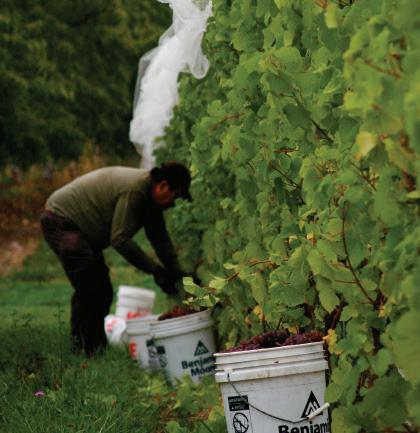
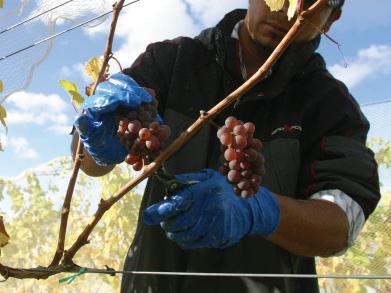
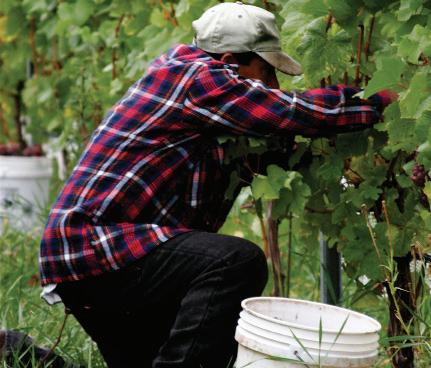
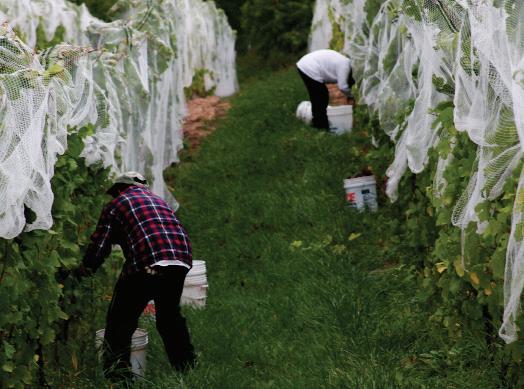
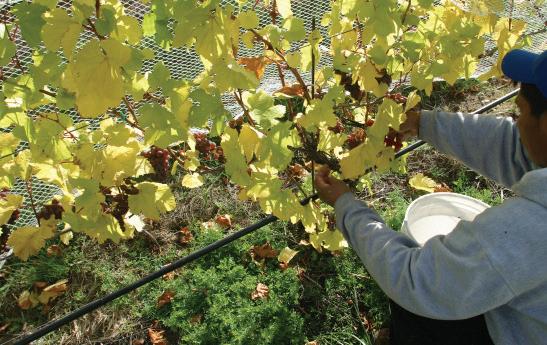
had on his season and employees. “My crew was small, aware, and I’d say nonchalant,” responded Cunningham. “I had masks and hand sanitizer available, and they were all still on the shelf at the end of the season. [Larger companies reported the same.] Protective gear was made available, but pretty much only used when going shopping; when you are at home or camp, you are not that careful when around the people you live with. There were always a couple folks wearing masks in the field, but it was less than 10% of the total crew.” Cunningham has taken a very safe yet efficient approach to labor amid the virus and economic crisis. A 2020 NPR article states that the amount of money sent to Central American countries from migrant workers is expected to decrease by 7 percent, similar to what occurred during the 2009 global recession. This decrease in the amount of money sent to one’s home country is predicted to affect upwards of 1.2 million households in South America. The final question worth asking is why? Why are there immigrants (both documented and undocumented) coming in through the Southern border to do the work the American people are not? Evidently there is a need for seasonal workers in the agricultural industry. The answer to this is multifaceted: and relates to both the economics and current views toward agriculture. Many people think of themselves as “better” than farm work; they have little interest in it. Yet we are all reliant on farming in one way or another. To quite literally rely on the fruit of labor but still not be willing to contribute to that part of the economy is close-minded. This is a form of entitlement. Shopping locally grown fruit (keep in mind I did not say local organic) can cost near the price of fruits imported from California. Not only will you be benefiting the local economy, you have the potential to get a true feel for the community. There are many farming jobs available and migrant workers are needed to fill some of those positions. The best chance to hold on to the fleeing remains of the American dream may be to mirror how the nation originally arrived here, allowing immigrants to enter the country and support the nation’s economy. It is not subject to a political party; it is purely factual that many Americans refuse to do the work Hispanic immigrants will. //










